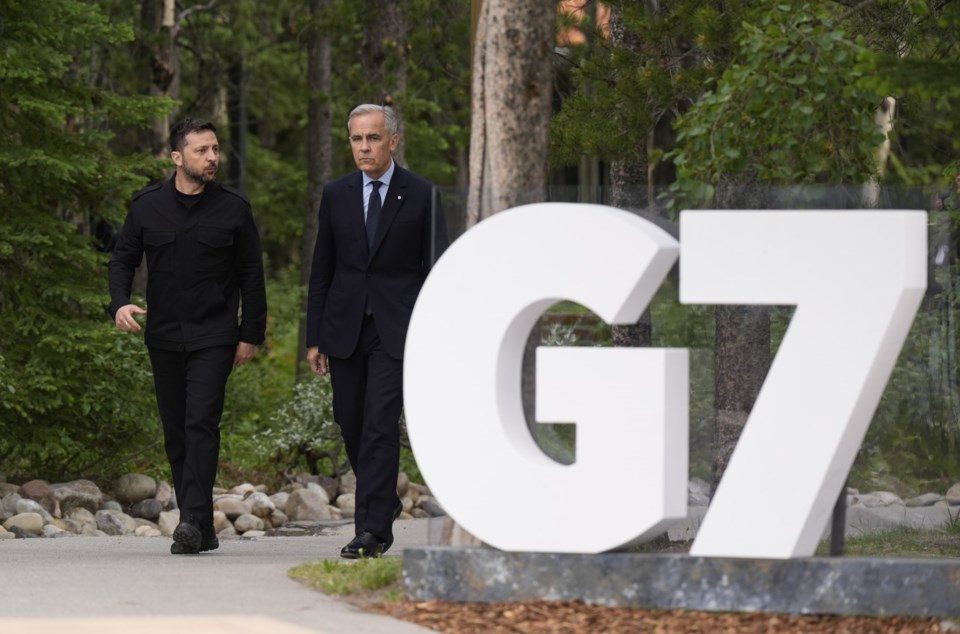OTTAWA — Prime Minister Mark Carney spoke with Ukrainian President Volodymyr Zelenskyy on Monday as world leaders sought to co-ordinate their response to a U.S.-Russia war summit that will not include Ukraine.
U.S. President Donald Trump and Russian President Vladimir Putin are preparing to meet in person in Alaska on Friday.
In a statement released after their call, Carney's office said that he and Zelenskyy "welcomed the leadership of President Trump and the United States in working toward securing peace in Ukraine."
"The two leaders underscored that decisions on the future of Ukraine must be made by Ukrainians, that international borders cannot be changed by force, that diplomatic engagement must be reinforced by continued pressure on Russia to end its aggression, and the need for robust and credible security to enable Ukraine to defend its territorial integrity and sovereignty," the statement said.
In a social media post, Zelenskyy said he and Carney agreed "there can be no decisions without clear security guarantees."
He also said they agreed that Russia is not seriously considering an end to the full-scale war it launched on Ukraine in 2022.
"We see it the same way, and it is obvious that the Russians simply want to buy time, not end the war," Zelenskyy said.
"The situation on the battlefield and Russia’s wicked strikes on civilian infrastructure and ordinary people prove this clearly."
The Ukrainian leader also said he is working to co-ordinate a response with allies.
German Chancellor Friedrich Merz has invited Zelenskyy, Trump and a number of European leaders to meetings on Wednesday.
The invitation list includes U.S. Vice President JD Vance, European Commission President Ursula von der Leyen, NATO Secretary-General Mark Rutte and the leaders of France, Italy, Britain, Finland and Poland.
Carney's office and the office of Foreign Affairs Minister Anita Anand have not responded to questions about whether Canada has been invited to take part.
Merz's office said the talks will focus on "further options for action to put pressure on Russia" and "preparations for possible peace negotiations and related issues of territorial claims and security."
The main worry for international leaders is that Trump and Putin may agree to terms that include swaps of Ukrainian territory.
Trump has suggested such a deal may include "some swapping of territories" but Ukraine and its backers in Europe say there's no sign Putin will offer anything in exchange.
The Europeans concede that Moscow is unlikely to give up control of Ukrainian land it holds.
"As we work towards a sustainable and just peace, international law is clear: All temporarily occupied territories belong to Ukraine," EU foreign policy chief Kaja Kallas said. "A sustainable peace also means that aggression cannot be rewarded."
Russia has occupied the Crimean Peninsula since 2014. Since the full-scale invasion began more than three years ago, it has illegally annexed the Donetsk and Luhansk regions in the east and Kherson and Zaporizhzhia in the south.
"In the end, the issue of the fact that the Russians are controlling at this moment … a part of Ukraine has to be on the table" in any peace talks after the Alaska summit, Rutte said on CBS on Sunday. He added that Ukraine's allies "can never accept that in a legal sense."
In a statement issued Saturday, European leaders said meaningful negotiations can only happen in the context of a ceasefire or a reduction in hostilities, adding Ukraine has "the freedom of choice over its own destiny."
Ukraine is pushing for security guarantees that would prevent another invasion. European leaders believe Kyiv should not be restricted in terms of the size of its army or the military equipment it's allowed to possess.
NATO allies agreed in 2023 to a process to allow Ukraine to eventually become a member state. The Trump administration has taken that membership off the table for the foreseeable future.
— With files from The Associated Press
This report by The Canadian Press was first published Aug. 11, 2025.
Sarah Ritchie, The Canadian Press



